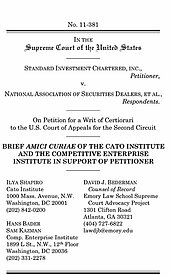Standard Investment Chartered, Inc. v. National Assoc. of Securities Dealers
Learn more about Cato’s Amicus Briefs Program.
As protestors across America condemn Wall Street for its greed and corruption, the Supreme Court has an opportunity to examine a ruling that holds some of Wall Street’s biggest regulators immune from suit. In 2006, the National Association of Securities Dealers and the regulatory arm of the New York Stock Exchange consolidated to form the Financial Industry Regulatory Authority (FINRA). NASD and FINRA are “self-regulatory organizations” (SROs), because the Securities and Exchange Commission charges them with regulating their own members — a set-up that is supposed to protect investors and the public. But NASD officers may have achieved the consolidation (and thereby received huge bonuses) by misstating material facts on a proxy solicitation, which induced member firms to give up some of their voting powers in exchange for a payout. Remarkably, the Second Circuit held that a lawsuit against NASD for the alleged fraud could not proceed because the defendants had sovereign immunity. Yes, SROs should be immune for their actions as quasi-government regulators. For example, immunity is appropriate for government actors like judges, who must have some protection from private suit to do their jobs properly. But judges are not immune for things they do in their private lives — they can be sued just like anyone else. The Second Circuit, however, held that SROs, which have expansive and varied powers, enjoy absolute immunity even for actions that are merely “incident to” their regulatory duties. That is, suits involving private corporate actions cannot proceed if they are incident to actions taken in a governmental capacity. In this case, the court found that the voting-rights changes were “incident to” FINRA’s regulatory activities because they were part of a plan to make a larger entity that would also have regulatory duties. This case raises serious constitutional issues about the role the judiciary plays in ensuring that SROs remain faithful to their delegated duties of protecting investors and the public. Because SROs are quasi-private actors, they have incentives to act in their own best interests — rather than in the public interest — and they do not have to be as transparent as fully public agencies. Further, the executive branch, including the SEC, has failed to hold SROs accountable for their self-serving behaviors. As we see from this case, the judiciary provides the sole opportunity for SRO accountability. Cato, joined by the Competitive Enterprise Institute, has now filed a brief urging the Supreme Court to review Standard Investment Chartered, Inc. v. NASD. Accountability among branches of government — the separation of powers and checks-and-balances — is a central tenet of our constitutional structure, and is especially important for SROs, which exercise great power over financial markets. Our brief argues that the judiciary remains the last check on SROs’ unbridled power and that the Second Circuit erred in failing to hold these SROs accountable.

This work is licensed under a Creative Commons Attribution-NonCommercial-ShareAlike 4.0 International License.


